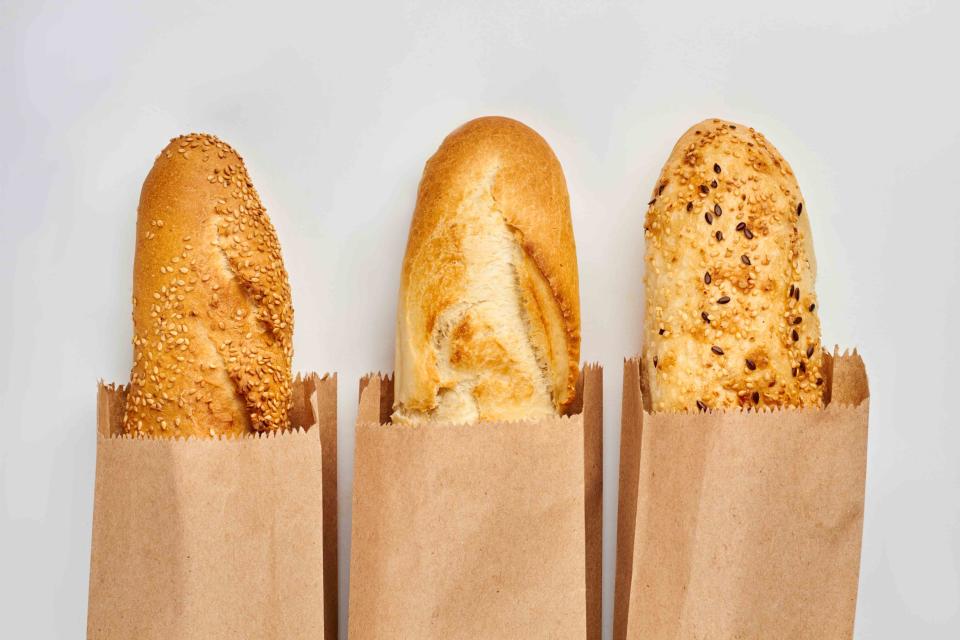Food Safety Experts Say You Should Avoid These 7 Mistakes When Grocery Shopping
Shop smart by keeping these potential errors top of mind.

Denisfilm /Getty Images
For some of us, grocery shopping can be one of the more enjoyable household chores, but it can also potentially be dangerous. The American food supply is among the safest in the world, but it isn't perfect. The FDA estimates there are about 48 million cases of foodborne illness annually—that's equivalent to one in six Americans getting sick every year. Even scarier, there are an estimated 128,000 hospitalizations and 3,000 deaths due to foodborne illness. The good news? You can help protect yourself and your family by avoiding common grocery shopping mistakes and adhering to basic food safety rules once you get back to your home and kitchen. Each section of the grocery store comes with its own risks. Here are some of the top mistakes to avoid, according to food safety experts.
Meet Our Expert
Gevork Kazanchyan MS, REHS, CP-FS, professor of environmental health at California State University, Northridge, and former public health deputy
Sheana Davis, a cheesemaker, chef, culinary educator, and owner of The Epicurean Connection, who is ServSafe certified
Related: 6 Common Food Storage Mistakes to Avoid, According to Food Scientists
Choosing the Wrong Store
Shoppers go to a fancy place thinking the look and style of the market are an indication of food safety, but that's not always the case, says Gevork Kazanchyan, professor at California State University, Northridge, and former public health deputy. "A store's display aesthetic, or marketed brand identity, is not a reliable indicator of the safety of its inventory or supply chain."
Retailers seem to be doing a better job with food safety since COVID, says Sheana Davis, a cheesemaker, chef, and owner of The Epicurean Connection. But Davis, who is ServSafe certified, says she is still amazed by how few staff members wear masks and gloves. She suggests you look to see if there is a sneeze guard above the olive bar and if sampling is monitored by a staff member before selecting your favorite Kalamatas. Also, look to see if stores have hand wipes and sanitizer available for customers. If you notice less-than-hygienic conditions, consider shopping elsewhere.
Buying Food With Damaged Packaging
Check what you are buying. "If there's a dent, rust, swelling, or other imperfections on canned food, or any breach in the packaging, then that's a no-go," says Kazanchyan.
Ignoring the Temperature of Prepared Food
Supermarkets often have prepared food in their deli department that is ready to serve. If you're considering buying any, Kazanchyan says to be cautious and pay close attention to temperature, "There should be no mountain of food; it should not be piled too far above the rim of the container. Generally, food should be flush with the pan." Also, the prepared food should be tangibly hot or cold: "Look for a thermometer on the face of the case indicating over 135 degrees Fahrenheit for hot food and cold food should be 41 degrees or less." Is colder better? Yes, says Kazanchyan. "The colder the better for cold items, while there's no benefit to warm food being held hotter than 135 degrees."
Not Being Careful With Seafood or Shellfish
Most of us are selecting seafood to cook. If you want to buy fish for sashimi or ceviche, "only buy fish listed as 'sashimi grade' that is kept very cold or on ice, and use it as soon as possible," says Kazanchyan. Plus, "If you're not going to use it shortly after purchase, cook it or freeze it. The same goes for meat." Davis says she appreciates fishmongers or clerks who offer her ice to keep seafood and shellfish cold.
Purchasing the Wrong Eggs
The risk of salmonella from eggs may be small, but it's worth avoiding. The best way to do this is to buy pasteurized eggs or liquid "shelled" eggs if you are not going to cook the eggs thoroughly. Pasteurized and liquid eggs are also the safest choice for people who are at high risk, such as anyone older, very young, pregnant, or immunocompromised, says Kazanchyan.
No matter what eggs you buy, check them for cracks—do not buy any that are cracked, as cracks can allow bacteria to enter the egg.
Selecting Too Large a Package of Salad Mix
Bigger isn't always better. "Don't be wooed by the large bag," says Davis. She buys packaged salad mixes, but small packs. "I'd rather buy three bags than one large bag. You might save a dollar, but a larger bag is more likely to spoil or get contaminated once you get home," she says. (Davis also recommends keeping hot and cold food separately in coolers in your car for transporting home.)
Related: How to Keep Bagged Salad Fresh for Longer, According to Food Scientists
Buying Bread That's Not Fully Packaged
Baguettes look charming peeking out of their paper sleeves, but they (and other loaves) should be fully covered. "How many people have touched it? Everyone squeezes bread and picks over bulk cookies, and hardly anyone wears those disposable gloves," says Davis. The grocery store may do a good job with safety, but they cannot protect you against the grubby hands of other shoppers.
Read the original article on Martha Stewart.

